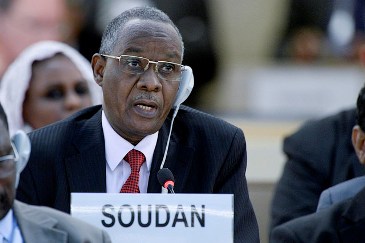Sudan slams international failure to provide human rights technical assistance
May 14, 2015 (KHARTOUM) – Sudanese justice minister, Mohamed Bushara Dousa Thursday severely criticized the international community for not providing technical assistance to his government to fulfil its human right obligations.

On Thursday Dousa met with the visiting independent expert Aristide Nononsi who is in Sudan for the first time since his appointment. The Sudanese minister asked him to encourage the international community to provide technical assistance and capacity building to improve the human rights in Sudan based on the recommendations of the former independent expert.
According to the official news agency SUNA, the minister of justice acknowledged that Sudan is facing some challenges in the field of human rights, before to accuse some countries- without naming it- of politicizing human rights issues.
He further pointed that the Un human rights body is not a political organ and called to observe its purpose.
“These countries reflect its political positions and its relations with us through this Council,” he further said.
Sudan last year called to end the mandate of the independent expert, and rejected accusations that his government is responsible for committing serious violations of freedoms and human rights, particularly in the conflict-affected areas of Darfur, South Kordofan and Blue Nile.
Khartoum also questioned the need for extending the mandate of the independent expert saying he has failed to render technical aid to Sudan as the international community also failed to lift sanctions and cancel debts or pressing rebels to stop violations and abuses.
Dousa urged the independent expert to work to end sanctions imposed on Sudan and the “unjust economic embargo”.
He said that these sanctions deprived Sudan of expansion and advancement in the various areas of development, pointing to education, health, communications and others.
He further called on the independent expert to commit himself to his attributions and to discuss with the government of Sudan ways to provide technical support and capacity building to promote human rights.
The minister stressed his country’s cooperation with all UN institutions and readiness to implement the international conventions pertaining to the promotion and protection of human rights in line with constitution and laws.
Dousa added that Sudan is working to strengthen these rights in accordance with basic terms of reference included in the Islamic law and customs and traditions of the Sudanese people, in addition to the Interim Constitution of 2005 as well as the international charters and conventions ratified by his country.
The new expert met during his first day with the Sudanese justice minister and the chairman of the Advisory Council for Human Rights.
In what is supposed to be a response to the Sudanese request to support the lift of economic sanctions, Nononsi told reporters following the meeting that his role is confined only to help the government to carry out international and domestic obligations in the field of human rights.
He further said he is in Khartoum not only to support the government but also accomplish his commitments for the Sudanese .
The independent expert will meet officials at the foreign ministry, the human rights commission, ministries of health, social care and education, and a number of civil society groups. Further he will visit North and South Darfur and will inspect the situation in the two capitals, El-Fasher and Nyala.
(ST)

